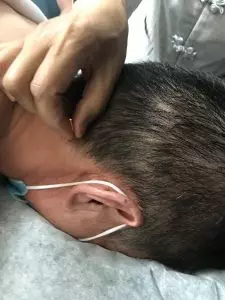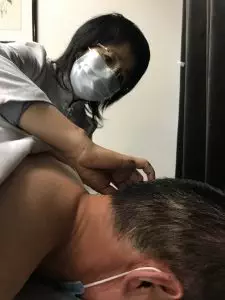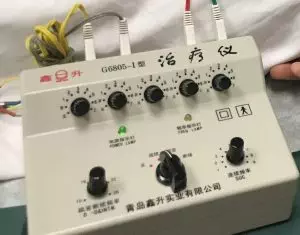By Qineng Tan, L.Ac., Ph.D.

Difficulty speaking, reading or writing due to brain damage is known as “aphasia.” Different types of aphasia can develop after a person has a stroke or head injury. Aphasia can also be a symptom of dementia. Acupuncture—especially “scalp acupuncture”—can help a person regain brain function and speech.
Aphasia—sometimes called “dysphasia”— is a language disorder that occurs because a part of the brain that controls speech, comprehension, and communication is not functioning correctly. This is usually due to damage or pressure on that part of the brain.
Scalp Acupuncture, sometimes called “neuroacupuncture,” is a specific technique that combines Traditional Chinese Medicine and Western medical understanding of neurology. Acupuncture needles are used to stimulate points on the head, or scalp, that have a direct effect on brain cells.
Scalp acupuncture can be helpful in treating acute and chronic central nervous system disorders that cause aphasia, as well as cognitive difficulties, trouble with motor skills, and even paralysis.
Scalp Acupuncture can be used to help people regain brain function after having suffered a stroke or injury to the head. Aphasia is generally considered to be related to this type of damage, but speech problems and trouble with cognition and comprehension can often occur with other neurological disorders, too.
This type of acupuncture treatment can also help people with neurological conditions such as:
- Parkinson’s disease
- Multiple Sclerosis/MS
- Alzheimer’s disease
- Guillain Barre Syndrome
- Ataxia
- Bell’s palsy
- ADD/ADHD
Neurological disorders cause problems with the way the brain communicates information and instructions to the organs and limbs via the nervous system; this is what leads to a wide variety of language and movement disorders.
Scalp acupuncture can be used to help these conditions because it can stimulate malfunctioning brain cells to begin working properly again, encourage the growth of new brain cells, and reestablish connections between the brain and the rest of the central nervous system.
Acupuncture can help improve some of the most common symptoms of neurological disorders like Alzheimer’s, Parkinson’s, and MS, including:
- Aphasia
- Headaches
- Dizziness
- Fatigue
- Mood swings
- Depression
- Muscle spasms, stiff muscles
- Seizures
- Tremor
- Paralysis
Scalp acupuncture can be an effective form of integrative medicine to help people overcome these symptoms, whether they are recovering from a stroke or suffering from a neurological disorder.
What is Scalp Acupuncture?

Acupuncture is one of several modalities used in TCM, which is a complete medical system with a history going back thousands of years. The stimulation of points on the head and/or scalp has always been used as a method for treating all types of symptoms and underlying conditions.
“Scalp acupuncture” is a term that refers to a more specific, contemporary acupuncture technique that combines ancient TCM knowledge with modern medical understanding of the anatomy of the brain and the way parts of the brain interact with the nervous system to control various bodily and sensory functions.
In Chinese Medicine, acupuncture points are usually chosen based on the theory of the meridians—channels along which Qi (energy) moves through the body. Along each meridian lie several points that connect organ systems and parts of the body. This concept of a network system of meridians is more metaphorical in nature, rather than based on actual physiology. In TCM we may consider that a problem in one part of the body is related to an imbalance in a (seemingly) different organ system. For example, anxiety and heart palpitations might be treated by needling a point on the head that is on the Stomach meridian.
In Western medicine, “somatotopic arrangement” describes the understanding of how parts of the brain, and particularly the nerve endings on the scalp, are arrayed in a pattern around the skull and correspond to different sensory functions, such as speech, visual perception, balance, and motor skills. With MRI technology, scientists have been able to “map” out how parts of the nervous system on the scalp correspond to parts of the body, like the feet, and the hands, etc.
With the practice of scalp acupuncture, we are combining these concepts and using acupuncture as a way of directly influencing parts of the brain, like the cerebral cortex, hypothalamus, cerebellum, etc. This can help both to heal parts of the brain that might be damaged due to a stroke, and to regulate functioning of those parts, so as to help restore proper functioning of motor activities and the senses.
This technique involves the insertion of small acupuncture needles into the tissues just beneath the surface of the skin on the scalp. Then, the needles may be be stimulated, either by manually twisting, or with electro-acupuncture (sometimes called “electro-stim”). Here, we attach small electrodes to the needles, and a mild to medium level of electric current flows to activate a vibration and/or rotation.

As part of the goal is to reactivate nervous system connections, the patient may be asked to be active during the treatment; that is, by moving the part of the body that is experiencing weak movement, or at least, to visualize or imagine themselves performing the movement.
One study of patients being treated with scalp acupuncture for aphasia showed that 46% showed “marked improvement,” while almost all patients showed some improvement.
In a study of scalp acupuncture for treatment of paralysis, all patients showed improvement, while 68% were cured.
While more research is needed, it is also believed that scalp acupuncture may be a good alternative therapy to help treat mental health issues, like depression, anxiety, and PTSD, as well as sleep disorders, like insomnia.
Scalp Acupuncture for Aphasia and Stroke Recovery in Los Angeles
At Art of Wellness, we have over 30 years of experience treating neurological disorders of all kinds. Our training in China gave us a thorough understanding of integrative medicine, using both TCM and Western medicine knowledge to provide the best possible outcomes for our patients. We have continued to grow and learn, while working closely with doctors and patients in Los Angeles since 1995. If you or someone you love is recovering from a stroke, or living with a chronic neurological condition, please consider trying acupuncture as an adjunct treatment.
*This article is for education from the perspective of Traditional Chinese Medicine only. The education provided by this article is not approved by FDA to diagnose, prevent, treat and cure human diseases. It should not stop you from consulting with your physician for your medical conditions. Traditional Chinese Medicine is based on Qi, which is an invisible force that usually cannot be observed by modern science. Because science focuses on testing ideas about the natural world with evidence obtained through observation, these aspects of acupuncture can’t be studied by science. Therefore acupuncture and Chinese herbs are often not supported by double-blind, randomized trials, and they are considered alternative medicine therapies in the United States.
